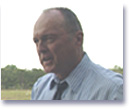|
INTERVIEW
TRANSCRIPTS - Bryan Duncan
In response to your concerns that you mentioned, too often we speak of sustainability. The immediate response is to think of the ecosystem, the environmental resource base, the technology, and that's not all there is to the picture, obviously. There certainly is economical sustainability, and you want to be able to generate real economic benefits for those who are associated with that industry and to sustain those benefits over time and then the social benefits, which you are far better to address than I. But I am also concerned about our history, embedded in a bias towards the small-scale producer, that's changing a little bit incrementally with time. But one of our concerns is the social sustainability. I'm not sure I understand all of the ramifications to this. But as a social being myself and as one who lives in community and in family and I understand what some of these issues are with sustaining the life of the community, sustaining the life of the family, providing opportunities for those people to become more productive engaged members in their societies -- so it's a very broad concern which certainly transcends the purely technical. I think it's well that we make some effort not to draw caricatures, which is pretty easy to do. When you try to make a point, you want to make a point, you want to make it clear, unambiguous, but you run the risk of drawing caricatures. On one hand, I have witnessed and as I've worked along the coastal communities in Indonesia for 5 years, I have been in communities where the small holder -- the local artisenal fisher folks -- have pretty well wiped out their mangrove environment in which they where they were living. That certainly was not a sustainable practice. Of course they had needs -- and there were lot of them -- and relatively little mangrove resource to support them. So we see that happening on that scale as well, the destruction of the environment. On the other hand, I know of specific examples of corporations and I admit there are many fewer than I would like to see out there, but nonetheless have brought real changes to the communities in which they found themselves. One I speak of has created quite a bit of labor opportunities, particularly in the processing aspects of their production system. There are clinics and physicians where there were none before. There are schools, there are loan programs for their workers to improve their houses, to drill wells for water. There are scholarship moneys, which are set aside for their children to buy the obligatory school uniforms and go off to the next city where there is a high school when there may not be one in their village. What price does this all comes at, I'm not prepared to say here, but the immediacy of those sorts of benefits are attractive and you see them when you are there amongst them. And so again, you have the range on both ends of the spectrum and I think that needs to be acknowledged and recognized.
Yes. They bring the shrimp in from the ponds, they will de-head them, and de-vein them, pack them, weigh them, count them, sort them, grade them, quick-freeze them, package them, and then they are all loaded onto a container and a truck comes and takes them off to a port or to a major city where the market is. And that's a lot of hand labor, a lot of people doing this, and a lot of jobs as a result. So on one hand it's the renaissance of a coastal community is not necessarily a consequence of industrialization, but on the other hand it's not all ruination and despoliations of the communities' families and the environment either.
|
 Dr.
Bryan Duncan is Professor and Director of Fisheries and Allied
Aquacultures at Auburn University, Alabama.
Dr.
Bryan Duncan is Professor and Director of Fisheries and Allied
Aquacultures at Auburn University, Alabama.